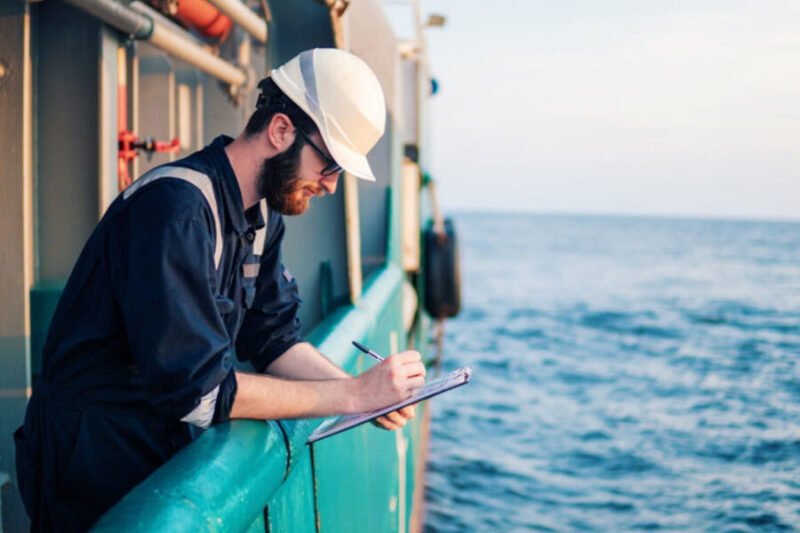The maritime industry is vital to global trade, yet the mental health of those working at sea is often overlooked. Life on a ship comes with its own set of unique challenges—extended periods away from loved ones, long hours, the monotony of routines, and the constant pressure to perform under unpredictable conditions.
Mental health at sea is not just about addressing occasional bouts of loneliness or stress but involves tackling systemic issues that impact the well-being of seafarers. This blog explores the realities of mental health challenges at sea, practical strategies to maintain wellness, and resources available to support maritime professionals.
Understanding the Impact of Isolation and Stress
The challenges faced by maritime professionals
For seafarers, isolation is woven into their daily reality. Unlike other industries where individuals can return home every evening to supportive environments, crew members live and work on ships for months, often with limited communication with their families. The unpredictable weather, restricted movements, and lack of recreational outlets compound these feelings of isolation.
A study published by The Mission to Seafarers found that 40–50% of seafarers experience depression at some point during their careers. The demanding schedules often lead to mental fatigue, while cultural and language differences among multinational crews may create communication barriers, affecting morale and social support systems onboard.
The psychological toll of maritime work
Isolation doesn’t just lead to loneliness—it can cause severe mental health issues, including stress, anxiety, and depression. Constant separation from loved ones can be emotionally draining, and crew members often neglect their well-being to prioritise operational performance. Research also shows stress can manifest physically, in the form of fatigue, poor eating habits, or sleep disturbances.
Here’s what a mental health expert, Dr Anna Byrne, elaborates on: “Sailors spend months disconnected from the world. Without proactive mental health resources, isolation can erode their resilience.”
Strategies for Overcoming Isolation and Stress
While the challenges of working at sea are immense, there are several ways to maintain mental balance and build emotional strength.
1.Build a Routine for Self-care
Structure your day with activities that promote both physical and mental health. For example:
- Exercise regularly – Even a short workout can improve your mood and keep stress at bay. Bodyweight routines or yoga can be performed even in confined spaces.
- Relaxation techniques – Try deep breathing or mindfulness meditation to manage overwhelming emotions.
2.Stay Connected with Loved Ones
Though communication opportunities aboard ships may be limited, make an effort to stay in touch. Regular calls, emails, or even simple text messages can create an emotional lifeline between seafarers and their families.
3.Harness Onboard Support
Build a strong support system among your teammates. Crew members who watch out for one another can foster trust and alleviate feelings of loneliness. Many employers also offer confidential Employee Assistance Programmes (EAPs) for professional counselling and support.
4.Seek Professional Help
It’s important to normalise asking for mental health support. Mental health professionals tailored to maritime workers understand the specific challenges seafarers face. If emotional struggles persist, seeking professional guidance can help you manage stressors before they escalate.
Technological and Community Solutions
Thanks to advancements in modern technology and community initiatives, seafarers now have access to tailored mental health resources.
Digital Tools for Maritime Wellness
- Wellness Apps: Apps like WellAtSea provide seafarers with guided meditations, fitness routines, and mental health resources.
- Online Counselling Services: Platforms like Seafarers Support Network offer therapy sessions over Zoom or Skype, allowing private, remote consultations.
- AI Chatbots: Innovative tools such as AI chatbots can provide emotional assistance or quick stress-relief exercises at the touch of a button.
Community Advocacy
Seafarer-focused organisations, such as Sailors’ Society and International Seafarers’ Welfare and Assistance Network (ISWAN), actively campaign for better mental health awareness and policy. Their initiatives include helplines, maritime chaplains, and self-care workshops designed to uplift seafarers’ well-being.
Real-life Success Stories
The strength of the maritime community is truly inspiring. Here are two stories of maritime professionals overcoming mental health challenges to create positive change at sea.
Captain Joseph’s Story
After suffering bouts of anxiety during long voyages, Captain Joseph began practising mindfulness techniques shared by a fellow crewmate. Over two years, he cultivated a habit of journaling reflections at the end of each day, which helped to reduce overthinking and sleep issues. He now advocates for onboard wellness workshops, leading by example to support junior crew members.
Maria’s Journey
An onboard engineer, Maria struggled with isolation during her nine-month deployments. Through Sailors’ Society’s wellness retreats during shore leave, she learned stress-management practices and began volunteering as a mental health ambassador within her fleet. Through her efforts, the company incorporated an onboard mentorship programme that pairs junior recruits with experienced crew.
Keep Mental Health a Priority at Sea
Your mental health is just as important as completing your daily maritime operations. Adopting strategies like maintaining routines, fostering connections with loved ones, and utilising modern-day wellness support systems can make all the difference when enduring extended periods of isolation.
The maritime industry still has a long way to go to fully address mental health needs. However, by raising awareness, prioritising mental well-being, and implementing more community-driven solutions, we can collectively support the professionals who ensure the smooth ebb and flow of global trade.
If you’re a maritime professional, explore resources designed specifically to support your wellness. Check out organisations like Sailors’ Society or WellAtSea for tools and support networks tailored to you.
Frequently Asked Questions
What mental health challenges do seafarers face?
Seafarers often deal with loneliness, stress, and anxiety caused by long periods away from loved ones, long work hours, and limited access to mental health resources while at sea.
How does isolation affect mental health at sea?
Prolonged isolation can lead to feelings of despair, anxiety, and depression. Without proactive measures, isolation may also result in emotional exhaustion and burnout.
How can seafarers combat feelings of isolation?
Seafarers can combat isolation through self-care practices, staying connected with loved ones, building onboard friendships, seeking counselling when needed, and engaging with wellness technologies designed for maritime professionals.








